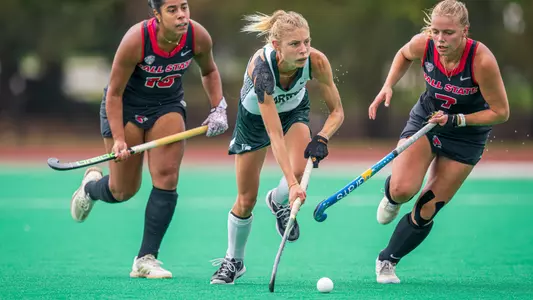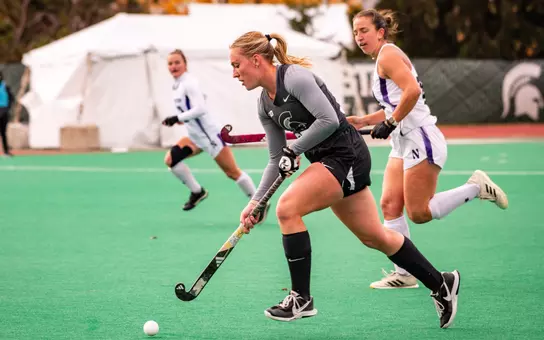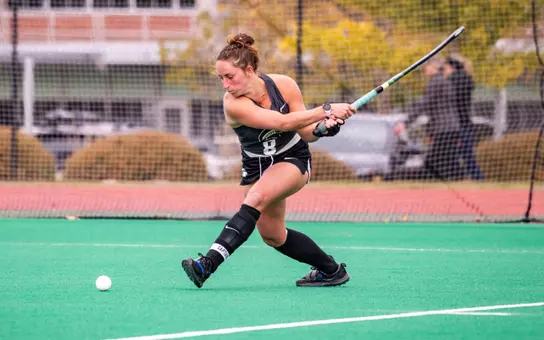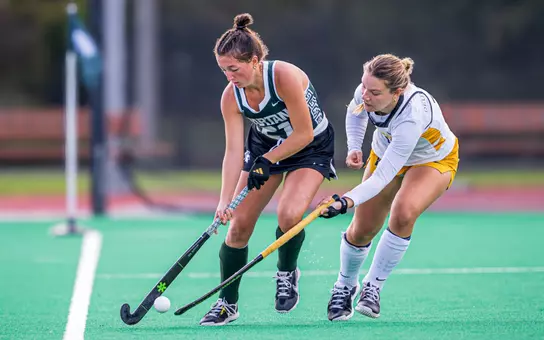
Lili Knorr: A Summer Abroad
11/17/2025 11:02:00 AM | Field Hockey
By David Delgado
For msuspartans.com
While many college athletes spent their summers training or catching up on rest, Michigan State field hockey player Lilian "Lili" Knorr chose a different kind of challenge - one that took her more than 7,600 miles from East Lansing to a small island in western Kenya.
For six weeks, the sophomore midfielder volunteered at a community health center and orphanage on Rusinga Island, working alongside local medical staff, helping vaccinate children, and building lasting bonds with members of the village.
The trip, which Knorr discovered through social media, was born from a desire to do something meaningful during her long summer break. Through AIESEC, a global youth-led organization that connects students with international service programs, she joined a local project focused on community health and education.
"I didn't just want to be home," Knorr said. "Most of my friends were gone, and I thought maybe I could find a volunteering thing this time — something that would help my résumé but also let me actually get to know people from another country."
According to AIESEC representative Dan Lozano, experiences like Knorr's are designed to help young people grow beyond the classroom.
"It's important to have opportunities like this when you're young," Lonzano said. "They teach you how to adapt, how to connect with people from different cultures, and how to see the world with new eyes."
It didn't take long for Knorr to realize that Kenya would offer lessons no classroom or practice could. When she arrived on the island, she was met with overwhelming warmth — and curiosity.
"Where I was, it was a very small place, just the community," she said. "Everyone was so welcoming and kind, but it was definitely a lot at first. They were curious about me, always wanting to greet me and ask where I was from."
Life on the island moved at its own rhythm — slower, simpler, but rich in connection. Knorr's days began at sunrise and started formally around 8 a.m. at the local health center, where she assisted with HIV testing, prenatal visits, and vaccination outreach programs. Occasionally, she witnessed births or accompanied nurses into the community to provide care.
"The workdays were relaxed but eye-opening," Knorr said. "They didn't have much equipment, but they made the most of what they had."
The limited resources were a constant reminder of the gap between Kenya and her home environments. Power outages were frequent, and supplies were minimal. Privacy was almost nonexistent.
"You couldn't rely on power — sometimes the generator wouldn't work," she recalled. "And the rooms… if you saw them, you wouldn't want to be sick and lie down there."
When the workday ended, Knorr spent her afternoons at the orphanage next door, where she quickly became a favorite among the children. She'd play games, bring small treats, and help with daily chores.
"They were always so happy to have someone around," she said. "Some of them still message me to ask how I'm doing. That means a lot."
The experience reshaped her understanding of privilege, gratitude, and opportunity. Growing up in Germany and now studying in the U.S., Knorr said Kenya gave her a clearer sense of perspective.
"I think I've become a lot more grateful for the stuff I have and for being able to study in the States," she said. "A lot of people there told me their dream destination was the U.S. — it's still the American dream for them. Especially as an athlete here, I'm given so much. Sometimes it's ridiculous, and I just try to be more thankful."
That sense of perspective is exactly what AIESEC hopes students take away from their time abroad.
"When students step into a completely different environment, they're not just helping others — they're growing themselves. That kind of personal development and cultural awareness stays with you long after the trip ends," Lozano said.
Ironically, Knorr's summer away from field hockey arrived at the perfect time. She was recovering from a stress fracture in her femur — her first major injury, and the slower pace of life in Kenya forced her to rest both physically and mentally.
"I've always loved being active, so it was hard to not be able to train," she said. "But being in Kenya taught me it's okay to take a break and let your body recover. I learned patience — with myself and with others."
Even without structured training, Knorr found ways to stay connected to the sport. The orphanage had a few worn-out hockey sticks, and with the help of another volunteer who also played, they hosted a pair of informal practices for the kids.
"They loved it," she said.
Returning to East Lansing, Knorr brought back more than souvenirs or memories. The experience gave her a renewed mindset — one that now guides how she approaches both field hockey and life.
"It gave me perspective, it reminded me that teamwork, patience, and gratitude matter just as much off the field as they do on it," Knorr said.
Knorr hopes to continue exploring global opportunities, though she's now leaning toward an internship — perhaps in health or research — that will let her apply what she learned abroad in a new way.
"I don't know if I'd do a six-week volunteer project like that again," she admitted with a laugh. "But I'm really glad I did it. It changed the way I see things."
For msuspartans.com
While many college athletes spent their summers training or catching up on rest, Michigan State field hockey player Lilian "Lili" Knorr chose a different kind of challenge - one that took her more than 7,600 miles from East Lansing to a small island in western Kenya.
For six weeks, the sophomore midfielder volunteered at a community health center and orphanage on Rusinga Island, working alongside local medical staff, helping vaccinate children, and building lasting bonds with members of the village.
The trip, which Knorr discovered through social media, was born from a desire to do something meaningful during her long summer break. Through AIESEC, a global youth-led organization that connects students with international service programs, she joined a local project focused on community health and education.
"I didn't just want to be home," Knorr said. "Most of my friends were gone, and I thought maybe I could find a volunteering thing this time — something that would help my résumé but also let me actually get to know people from another country."
According to AIESEC representative Dan Lozano, experiences like Knorr's are designed to help young people grow beyond the classroom.
"It's important to have opportunities like this when you're young," Lonzano said. "They teach you how to adapt, how to connect with people from different cultures, and how to see the world with new eyes."
It didn't take long for Knorr to realize that Kenya would offer lessons no classroom or practice could. When she arrived on the island, she was met with overwhelming warmth — and curiosity.
"Where I was, it was a very small place, just the community," she said. "Everyone was so welcoming and kind, but it was definitely a lot at first. They were curious about me, always wanting to greet me and ask where I was from."
Life on the island moved at its own rhythm — slower, simpler, but rich in connection. Knorr's days began at sunrise and started formally around 8 a.m. at the local health center, where she assisted with HIV testing, prenatal visits, and vaccination outreach programs. Occasionally, she witnessed births or accompanied nurses into the community to provide care.
"The workdays were relaxed but eye-opening," Knorr said. "They didn't have much equipment, but they made the most of what they had."
The limited resources were a constant reminder of the gap between Kenya and her home environments. Power outages were frequent, and supplies were minimal. Privacy was almost nonexistent.
"You couldn't rely on power — sometimes the generator wouldn't work," she recalled. "And the rooms… if you saw them, you wouldn't want to be sick and lie down there."
When the workday ended, Knorr spent her afternoons at the orphanage next door, where she quickly became a favorite among the children. She'd play games, bring small treats, and help with daily chores.
"They were always so happy to have someone around," she said. "Some of them still message me to ask how I'm doing. That means a lot."
The experience reshaped her understanding of privilege, gratitude, and opportunity. Growing up in Germany and now studying in the U.S., Knorr said Kenya gave her a clearer sense of perspective.
"I think I've become a lot more grateful for the stuff I have and for being able to study in the States," she said. "A lot of people there told me their dream destination was the U.S. — it's still the American dream for them. Especially as an athlete here, I'm given so much. Sometimes it's ridiculous, and I just try to be more thankful."
That sense of perspective is exactly what AIESEC hopes students take away from their time abroad.
"When students step into a completely different environment, they're not just helping others — they're growing themselves. That kind of personal development and cultural awareness stays with you long after the trip ends," Lozano said.
Ironically, Knorr's summer away from field hockey arrived at the perfect time. She was recovering from a stress fracture in her femur — her first major injury, and the slower pace of life in Kenya forced her to rest both physically and mentally.
"I've always loved being active, so it was hard to not be able to train," she said. "But being in Kenya taught me it's okay to take a break and let your body recover. I learned patience — with myself and with others."
Even without structured training, Knorr found ways to stay connected to the sport. The orphanage had a few worn-out hockey sticks, and with the help of another volunteer who also played, they hosted a pair of informal practices for the kids.
"They loved it," she said.
Returning to East Lansing, Knorr brought back more than souvenirs or memories. The experience gave her a renewed mindset — one that now guides how she approaches both field hockey and life.
"It gave me perspective, it reminded me that teamwork, patience, and gratitude matter just as much off the field as they do on it," Knorr said.
Knorr hopes to continue exploring global opportunities, though she's now leaning toward an internship — perhaps in health or research — that will let her apply what she learned abroad in a new way.
"I don't know if I'd do a six-week volunteer project like that again," she admitted with a laugh. "But I'm really glad I did it. It changed the way I see things."
Spartans All-Access | Senior Reflections
Tuesday, November 12
Inspiring The Spartans | Spartans All-Access
Wednesday, September 18
Spartans All-Access | Making Each Other Better
Wednesday, August 21
Spartans All-Access: Ashley Harlock
Thursday, November 02




